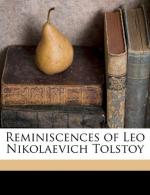|
This section contains 3,872 words (approx. 13 pages at 300 words per page) |

|
SOURCE: "Suicide and Sacrifice in Tolstoy's Ethics," in The Russian Review, Vol. 22, No. 2, April, 1963, pp. 157-67.
In the following essay, Spence argues that at the time of his conversion, Tolstoy was caughtbetween the extremes of suicide and asceticism to resolve his existential dilemmas.
Tolstoy's ideals of non-resistance and of complete celibacy are both derived from the same two beliefs, one of which is positive—that God exists; and the other negative—that we need to renounce the welfare of the personality.1 He himself had already renounced the welfare of his personality before he came to believe in God (he was going to kill himself), and this fact is fundamental to his understanding of Christianity and his formulation of an ethical code. For this code, when expressed in a concrete form applicable to life, is negative. The five commandments of the Sermon on the Mount, which for him constitute...
|
This section contains 3,872 words (approx. 13 pages at 300 words per page) |

|


